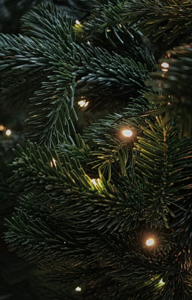Did you know that your Christmas tree could be home to mold spores, dirt, and insects? Live Christmas trees are a popular, festive decoration, but they do require some special care to keep you and your family healthy. ServiceMaster of Baltimore has helped families enjoy safe holiday seasons for over six decades. Learn more about how to prevent Christmas tree mold so you can have a safe and healthy season.
Christmas Tree Syndrome
People with sensitive respiratory systems, such as those with allergies or asthma, are especially susceptible to Christmas Tree syndrome. Mold spores growing in your Christmas tree can cause respiratory symptoms like sneezing, itchy and watery eyes, runny nose, or coughing. It’s easy to miss these symptoms, but they can be a sign of mold.
Both live and artificial trees can have mold, but live trees are more of a risk. Tree mold is a common allergen, and when a live tree is cut and brought inside, those spores react with the warmth and condensation in your home and spread rapidly. Artificial trees can collect dust in a humid storage area, like an attic or basement, which can create mold.
Once you have mold, it’s hard to get rid of because of how quickly it spreads through the air and attaches to moisture. It’s much easier to take simple steps to prevent Christmas tree mold so you can avoid the problem altogether.
How to Prevent Christmas Tree Mold
Both cut-your-own and pre-cut live Christmas trees can harbor mold that can cause allergic reactions. Be aware of pre-cut trees that have been sitting outside for days or weeks before you bring them home, as they can collect mildew deep inside the branches. Cutting your own tree has its own risk of mold since the tree is living outdoors and subject to the elements.
You can use a leaf blower to physically remove mold spores from your tree, but you can also spray it with a water and vinegar solution to kill any spores and bacteria. While trees need to be watered, be careful to avoid getting it too wet to avoid mildew growth in the branches. It is also a good idea to give your artificial tree a good shake and rinse outdoors to remove dust particles.
You can also take steps to filter the air in your home by using high-quality air filters in your HVAC system and keeping the humidity in your home below 45% to discourage spore spread. Remember: mold loves moisture, so the lower the humidity, the lower your chances of a Christmas tree mold problem.
Mold Cleanup in Baltimore, MD
Mold can cause serious health problems for people with asthma and even people who don’t normally have allergies. If you’re dealing with the effects of Christmas tree mold or another mold problem, don’t wait. Call ServiceMaster of Baltimore at 410-780-1700 today!


